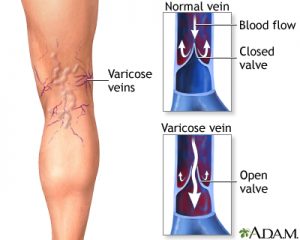Weight gain and obesity can have unexpected consequences on your health. The extra weight can exert an excessive amount of pressure on your circulatory system and lead to a condition known as varicose veins. This is when your veins valves become weak and no longer function properly, allowing blood to reflux or pool in the veins. We are often asked, will varicose veins go away in I lose weight? And although the condition differs from case to case, the truth is varicose veins may not always be as reversible as weight gain. In fact, most cases of varicose veins will not go away without medical intervention.
Why varicose veins don’t go away if you lose weight
While losing weight can benefit your overall health and by extension your circulatory system, these changes may not be sufficient enough to repair your weak or malfunctioning vein valves. Furthermore, there may be other underlying reasons for your varicose veins which may or may not be related to the weight gain.
Below are some common causes of varicose veins, other than weight:
Genetics
Research shows a definite link between varicose veins and your family history. If your mother or aunt had them, for example, your chance of developing varicose veins is 50% higher than someone without this condition in their genetic lineage. That’s because it’s possible to inherit weak vein valves in much the same way you inherit your eye colour.
Age
Not everyone develops varicose veins with age but it’s a risk factor. That’s because daily wear and tear on your veins can weaken the valves that propel blood towards the heart. Hence, it’s important to keep a healthy weight and good eating habits. For more on lifestyle changes which can help manage varicose veins: Non-Medical Options for Varicose Veins.
Long periods of inactivity
Whether you’re sitting or standing, staying in one position for extended time places an undue burden on your veins and forces your circulatory system work harder. If you work at a desk all day it’s a good idea to take breaks throughout the day and walk around. Similarly, if your job requires you to be on your feet all day (or you have a standing desk), sitting down and putting your feet up can improve blood circulation.
Gender and pregnancy
The hormonal fluctuations that women experience—such as birth control pills and pregnancy— can increase your risk of weakened vein valves. Pregnancy, in particular, is a major risk factor because a growing baby places pressure on your leg veins. Although your blood circulation will return to normal after your baby is born, your varicose veins may remain permanently.
History of blood clots
Previous trauma to your legs may have weakened your veins. And unfortunately, the weaker your veins, the higher your risk of developing varicose veins and DVT (deep vein thrombosis).
Treatment for varicose veins after weight loss
If you’ve lost the weight and still find yourself saddled with unsightly varicose veins, you may want to have them removed. Non-surgical treatments such as Endovenous Laser Therapy (EVLA), Radiofrequency Ablation (RFA) and Ultrasound-Guided Sclerotherapy close off the diseased vein and reroute blood flow to other healthy veins.
Seek expert advice
The doctors at The Vein Institute specialise in varicose vein treatment. We offer patients a comprehensive treatment program to treat varicose veins, with non-surgical laser treatment techniques. The benefits of laser treatment to patients are;
- Walk-in walk-out treatment
- 98% success rate
- Extremely effective
- Can be performed at a clinic (no hospitalisation)
- No general anaesthetic
- Medicare rebates apply
- No downtime or time away from work
Call us at 13 VEINS (that’s 13 83467), or fill out our booking request form.
See more vein facts: Answering Your Vein FAQs


